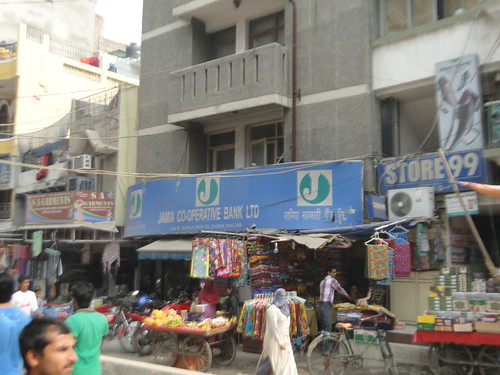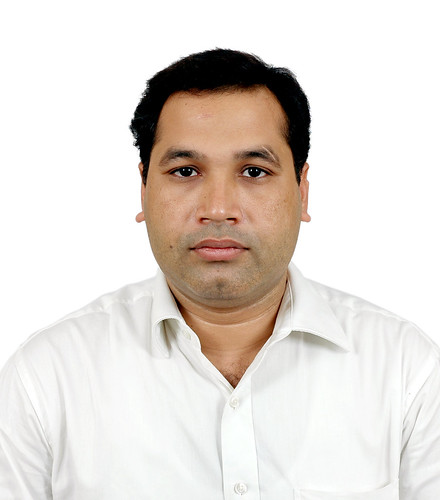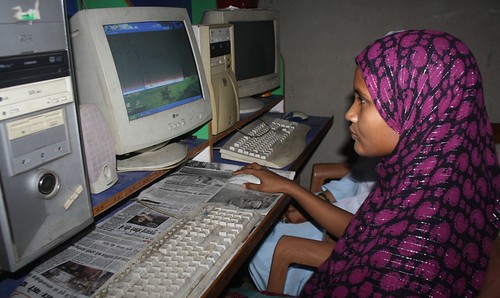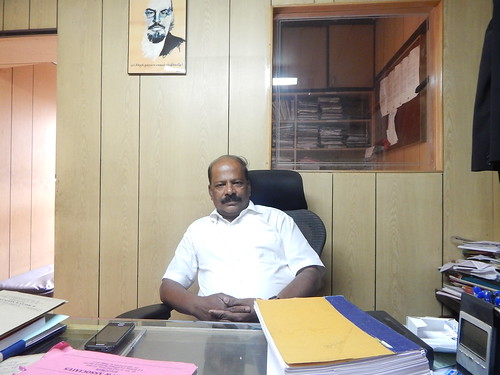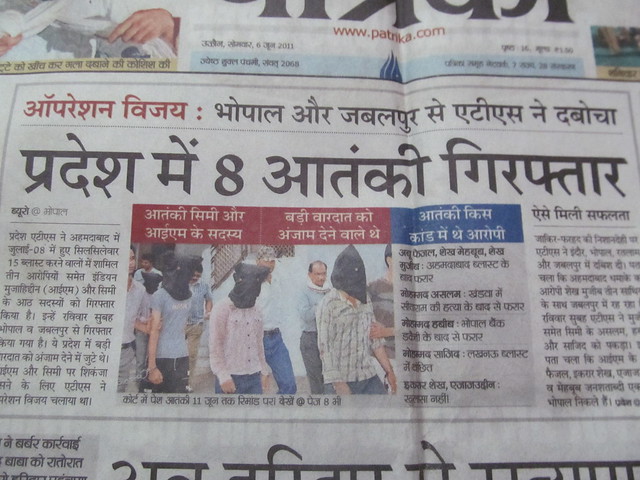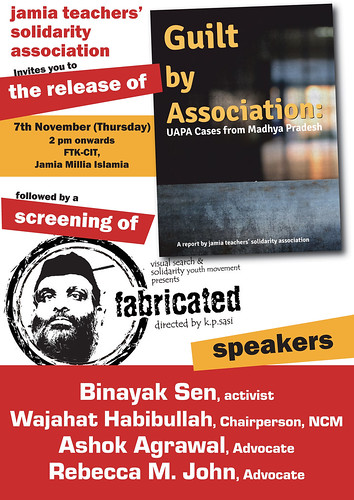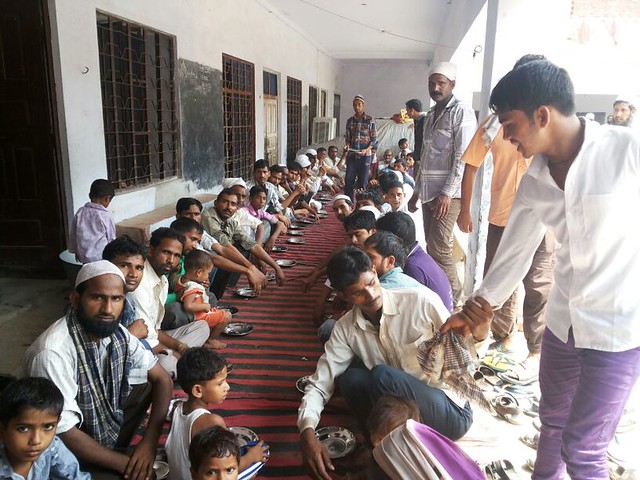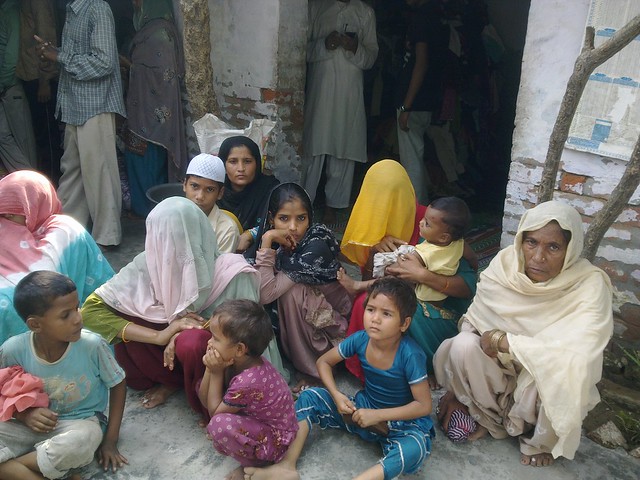By Maqbool Ahmed Siraj,
Educating a backward minority is a Herculean task. Muslims began thinking of modern education only around 1970. Today when the Information Technology, liberalization and globalization have begun to change the shape of the world, we are rubbing our eyes in disbelief over the strides made by erstwhile backward communities who have marched much ahead of Muslims, the rulers of yore. All this while Muslims had meticulously kept the mythical refrain of education having nothing to do with economy. But the world has asserted in totally unambiguous terms that affluence and influence are both inevitably linked to knowledge and people refusing to see this reality will have to pay a price in terms of economic well being as well as their rating in the powerful nations.
As a writer on Muslim development issue, I feel the Muslim educational planners should look at the following points:
An Overview of Muslim Situation in West Bengal and Assam
Muslims in West Bengal & Assam are least urbanized i.e., only 16.8% in West Bengal and 6.4% in Assam live in urban areas.
Literacy level: Muslims had 57% literacy against general 68.6% in WB. In Assam, Muslims were 48% literate against 63.3% among general population.
Mean Years of Schooling (MYS): Sachar Committee Reports had put West Bengal and Uttar Pradesh as states where MYS (for how many years a Muslim child of 7-16 years attended a school) as the least i.e., 2.84 years in West Bengal and 2.64 years. Muslim children were among those whose average years of attendance in schools was the least.
General Enrolment Ratio (GER)}: The report mentions GER among Muslims children of 6-14 years group in West Bengal being 82% as against 85.7% among the general populace. This is a heartening feature. Even in Assam it was 87% against 90 in general population.
Percentage of Matriculates: In the general population there were 38% people in West Bengal had completed matriculation in 2001. But among Muslims this figure stood at 11.9%. Among SCs and STs this percentage was 13%. The Reports has not mentioned these figures regarding Assam.
Percentage of Graduates: Among the general population 13% people were graduates while this figure for Muslims in West Bengal was around 2%.
Share of Muslim in State Employees: Muslims constitute 25.2% of state’s population while there were only 134,972 Muslim employees in the Government who represent only 2.1%. In Assam, Muslims constitute 30% of the state’s population while their share among government employees was 11.2%.
Put First things First Muslims should go for Mass enrolment of kids and checking dropouts
Muslims should not opt for top-down approach but rather should begin from the first baby step of setting up quality schools. A Muslim university here and an IAS coaching academy there may be fanciful idea, quite pleasing to the ear. But the work should start from basic institutions.
Care should be taken to enroll all children in whatever schools are available, and retaining them there for maximum period. This may entail organizing scholarships, transport facilities, midday meals or hostels. Charities should be channeled for these purposes. Pressure should be brought upon authorities to set up govt schools in Muslim habitations.
Schools run by Muslims should get affiliated to existing state education/examination boards and universities and follow their syllabus. Universities or boards flaunting word ‘Muslim’ are likely to serve as a stigma in the current atmosphere of bias and discrimination. Mega ventures are still not the Muslims’ cup of tea. While deficient resources are just one factor, the community clearly lacks serious academic approach essential for laying down strict norms for recruitment, evaluation and designing curriculum. While the ones already established by Muslims should continue, the new universities being set up by Muslims should adopt secular names. Apprenticeship in running colleges is essential before the community opts for setting up universities.
Education must not be Islamized
‘Islamization’ should neither be attempted nor demanded. It is simply suicidal. When we Islamize education, we also lend legitimacy to those who are out to saffronise the curriculum. They can very well ask, “when a minority is free to Islamize their schools, why not the majority saffronise their schools?” A better way to express the need for culturally sensitive curriculum is to say that ‘Privately managed Muslim schools should also provide for Islamic education up to a certain standard’. It should not be demanded in the state-run schools. And a curriculum on Islam should be informed and inspired with rationale and reasoning. Sometimes, the Islamisation takes very awful form. In a Muslim school the children were taught that Prophet Muhammad was the first man in space. Obviously, the teacher was trying to explain the Holy Prophet’s Meraj to heavens in contemporary scientific terms. They were dissuaded from doing so when a parent pointed out that Prophet Adam and his wife Eve (Hawwa) came down from heaven and Prophet Jesus was lifted to heavens and should thus be considered men (or woman) in space prior to the Holy Prophet.
Yes, Mother tongue is the best medium
But, kids are rapid learners of any language
Mother tongue is universally acknowledged as the best medium of education in early stages. If there is a sizeable section of Urdu speaking people in a ward or area, it is better to have Urdu medium schools upto 7th standard. But beyond this the community should enable the students to switch over to regional language medium or English.
Unavailability of Urdu medium schools should not be an excuse to keep away kids from schools. They must be sent to schools in whatever medium is available. Kids must be sent to school rather than be taught at home. Schools inculcate societal norms in them and kids are rapid learners of all languages.
Often Urdu medium is demanded for three principal reasons:
1-Culturally sensitive education,
2-To ensure that all teachers are Muslims and job opportunities get exclusivised for Muslims at least in Urdu medium schools, and
3-Urdu speaking parents could possibly guide the kids in their home coaching.
But at the same time, Muslims must be wary of its repercussions in matters of higher education. A child who has grown up learning zoo azaf aqal for LCM, mustateel for rectangle, murabba for square, darja e hararat for temperature, majlis e qanoon saz for Legislative Assembly, is all likely to develop disinterest for natural as well as human sciences after school primarily he would be learning a language other than his own. It is therefore necessary for Muslims to envision a future of a kid-turning-into-a-man. It is therefore necessary that kids are made to develop a vocabulary in vernacular language as well as in English. It is inevitable for a Muslim to be bilingual (or even trilingual) in an emergent India in order to realize his or her full potential.
Secondly, the Urdu linguistic skills are largely inapplicable in the market, courts, offices, banks, post office, railways, et al. Be it railway reservation forms or flight booking on Internet, or the water, phone or power bill, or operating the ATMs, or accessing the documents in municipal or government offices, it is the skills in local (or English) languages that rule the roost.
In a rapidly globalizing world, a lot many native languages are bound to lose their day-to-day relevance. It is not alone the question of survival of Urdu. The question haunts hundred of languages and dialects. UNESCO projections say only seven or eight principal languages would survive internationally. These are English, French, Spanish, Arabic, Chinese, Japanese, Russian and Hindi. It is better for Muslims to develop felicity in at least two of these languages and integrate themselves with international media, job opportunities and communication.
Right to education through mother tongue is guaranteed in the Constitution, but not the right to job
We need to be practical. Yes the Constitution of India does guarantee right to education through mother tongue in schools. But it does not necessarily guarantee jobs for all such students. Jobs and employment are decided by the market forces. English is not one among the languages in the 8th schedule of the Constitution but most high-paying jobs in private sector are available to English-knowing people. This is owing to the fact that most technical, professional and higher educational institutions teach through English medium and national and international businesses operate through English. So the practical wisdom should urge us to set our priorities right. Language formula should be decided at state level. If those who speak Urdu can opt for Urdu as the first language, it is sufficient. Often Urdu medium schools fare poorly in comparison to other medium schools because most teachers are Muslims, there is stress on rote learning, laxity in teaching, liberal evaluation (in order to see that every Muslim child passes) and relaxed monitoring by Urdu inspectors. There cannot be better way to commit collective suicide than having low quality education.
Quality springs from quantity
A lot of Muslims think in terms of setting up community run medical, engineering and management colleges. These are less likely to serve the community if there are no sufficient number of feeder institutions such as high schools and colleges imparting Pre-University education. Muslims in four south Indian states run at least 110 engineering, a dozen medical, 15 dental, and hundreds of other professional colleges. Barring a few, most of them do not have majority of Muslim students. So resource-short Muslims in UP, Bihar, West Bengal and Assam, should rather concentrate on improving academic performance of Muslim high schools and sending more of them into Government-run institutions where education is state funded. Investment on private coaching institutes for entrance exams or even providing scholarships and free board and lodging facilities in the Cities, is a viable alternative than investing hugely on mega ventures. Aligarh Muslim University could think of such initiatives. Its Constitution empowers it to initiate measures to ameliorate educational and social conditions of Muslims all over the country under article 5(2)c.
Gradually, the higher education is becoming a commercial proposition with less of social objectives. Thousands of BE seats in engineering colleges in South India go begging for students. Muslims must periodically review the changing higher education scene, financial dynamics of professional courses, court interpretations of Article 29 and 30, market needs and state as well as central Government policies. In short, a central think tank on Muslim education is the need of the hour.
There are enough of madrassas: Charities must now be directed towards modern education
There are simply too many madrassas in India. Nobody ever gives a thought if a madrassa is a prime need before setting up one. They are set up indiscriminately anywhere and everywhere if charities could be carved up. Several madrassas in Karnataka are now being run by moulvis from UP and Bihar just because religious charities come aplenty there. They often bring the students from those states and insist on teaching a syllabus that is out of sync with times. The graduates from madrassas suffer from low self-esteem as they are totally out of tune with the surrounding realities. Some of them even serve as cover for real estate, Hajj e badal and Umrah or qurbani businesses or take up matrimonial servicing. They are governed by no central affiliating, registering, auditing, certification, curriculum-setting or examining authority. The students graduating from their portals are fit for no job and therefore start new madrassas in smaller towns or remote locations and thereby perpetuate the backwardness of the community. The district of Basti in Uttar Pradesh has 371 large madrassas but only six primary schools run by Muslims.
Muslims must now think of investing their charities in modern education. Modern education creates self-reliance and nurtures self-esteem. It encourages creativity and innovation, the very essence of modern civilization. A community which has a vast army of muftis (opinion-givers) but no musleh (reformers) is bound to remain mired in the past.
Orphanages must be modernized
Most Muslim orphanages in India are run on traditional lines where the objective is to provide shelter to the destitute and the orphans. The focus is on physical well-being of the orphans rather than nurturing them into full human beings, self-confident, skilled and articulate. Kids are herded like flocks of goats and sheep, their heads tonsured regularly and are made to sit on the ground. Chowkidars keep them indoors within fortress like structures. They are object of abusive calls and everything is done to make them look like miserable creature. No effort is made to look at their innards, their psychological well being. No one sings them lullabies when they go to sleep, no one tells them the tales of chivalry of the legendary rulers of yore, no one relates them traditions of the holy Prophet, peace be upon him. Nor are they ever taken out on excursion or visits to parks, museums, botanical gardens and zoos. In Bangalore, we attempted two new institutions, ‘Rifaah Home for the Girl Child’ and ‘Ashiyana’ for the boys and introduced these reforms. Results are tremendous. In contrast, I questioned the traditional approach of herding the children like sheep in the century old orphanage here. The reply from the orphanage manager was: “If they cease to look like miserable kids, donations too would stop”.
Diversify professional profile
Muslims should take measures to diversify the professional profile of the community. Most bright students head for medicine, engineering and management courses. The community lacks able men and women in the field of law, journalism, fine arts, chartered accountancy, agricultural sciences, scientific research, designing, vernacular languages etc. Science and technology bring wealth and create disparities. People trained in journalism, law, sociology, economics should step into the field to even out the imbalances thus created. Not many thinkers, researchers, social and political scientists and economists, advocates have emerged out from the younger Muslims in India in recent years.
Pay Equal attention to Women’s education
Muslims must strive to include facilities for women’s education at all levels. Women’s role in the society is changing very fast. Women cannot be confined to cooking, washing and household chores any more. These functions are being taken up by machines. Muslims must think of inducting women into roles whereby their talents and faculties, which are on par with men, could be put to optimum use. Studies suggest that new kitchen aids, instant mixes and processed foods have reduced the actual cooking hours to merely one hour and 45 minutes. Studies also suggest that entry of one new home gadget (such as washing machines, remotes, mixers, vacuum cleaners) adds eight pounds to the weight of household women. Similarly, online facilities are expanding opportunities for women being employed (or used for income generation) in multiple ways.
Removing the disconnect between education and economy
Muslim artisanship is in decline. Modernisation and automation in the industry is sounding death knell for them. Several crafts have lost their relevance while others practically employ Muslims as daily wagers. Their finance, export and management is in the hands of persons who do not belong to the traditional occupational groups. Writing on the wall is clear: Modernise or perish. It will be unviable to carry on the crafts in the traditional way. Means and methods of production are changing every moment and they require new techniques, skills, calculations and methodologies. If education does not equip the younger generation, they will be misfits in the future society. Knowledge is doubling every five years and the community must keep pace with it. Unless it is done, the threat of irrelevance will loom overhead. It is where Muslims need to remove the disconnect between the education and economy.
During the last decades several occupations have been phased out. Sample these:
• Remember you would have kalaigars who would varnish your grandma’s copper and brass utensils once in a year. Aluminum and Stainless steel have replaced them. Kalaigars have vanished now.
• You would have your stone grinders (sil and okli) chipped once in a year. We used to call these people Takaras in Karnataka. They have become irrelevant due to modern blenders, mixers and juicers.
• STD booths have become irrelevant with cell-phone in every pocket. Thousands of such booths have vanished in oblivion within the last decade.
• Cyber centres are also on the way out as every cell phone would have Internet browsing facilities.
• Newspapers no longer have linotype typesetters. These machines are out. Even proof-readers job has been clubbed with sub-editors.
• Hoarding painters lost their jobs during 1990. Digital printing replaced them.
• Zari workers are losing their jobs as embroidery machines are coming in.
• Calligraphers were replaced by Urdu DTP operators.
• Silk reelers have been replaced by modern reeling machines.
• Photo studios have disappeared from our cities in thousands as digital cameras have eliminated the need for bromide photos.
• Banking has seen a big change from cheques to ATMs to Credit cards to mobile banking.
• Within next 20 years the printed newspapers will disappear. Various Browsing and reading devices will replace them.
• Credit cards and cheques too will vanish as money will be transferred through internet between businesses and banks by an individual who will merely press computer buttons and beeps and blips will signal transfer the cash from individual’s accounts to store’s accounts.
• There will be phenomenal changes in occupations like accounting, auditing, and dissemination of news, pharmacology, electioneering and voting, education, and training due to new online devices that will enter our lives.
As we advance deeper into the 21st century, the transformation in our lives would be much more drastic. We need to pattern our educational system for the future needs. Thomas Friedman in his book “That Used to be US” (2011) laments that US is falling behind in education as US school system is not one among the 10 best school systems in the world. PISA rating ranks Finland’s as the best education system. Singapore, South Korea, Switzerland, Japan, Hong Kong, and parts of China have overtaken the United States. We need to assess as to where do we stand?
……………………………..
Maqbool Ahmed Siraj is an eminent journalist and former Editor of Islamic Voice, Bangalore. He has also worked in the BBC World Service and writes regularly for the English daily Deccan Herald, Bangalore and several other magazines and journals. He also participates in various TV and radio programmes.
Note: This paper was presented at `The East & North East Educational Conference’ held on 26th October at Bhasha Bhavana Auditorium, National Library, Alipore, Kolkata, West Bengal, organized by M M Foundation of Kolkata and Al Falah Mission of Berhampur, Murshidabad.
Related:
Educational conference in Kolkata for education among Muslims

